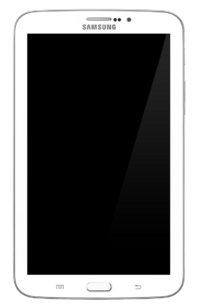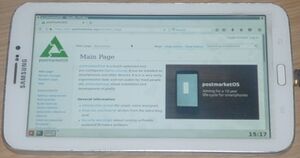Samsung Galaxy Tab 3 7.0 (samsung-lt023g): Difference between revisions
No edit summary |
No edit summary |
||
| Line 101: | Line 101: | ||
== About GPU == | == About GPU == | ||
The GPU is Vivante GC1000 which has open source drivers but we can't get it work yet. The reverse engineered driver is called etnaviv and the compiling process is a little bit complex. If anyone figures it out dont forget to tag @hpagseddy at postmarketos matrix server. Galaxy tab 4 7.0 have same GPU, and plasma mobile seems to work better with hw acceleration, but OpenGL is failing. | The GPU is Vivante GC1000 which has open source drivers but we can't get it work yet. The reverse engineered driver is called etnaviv and the compiling process is a little bit complex. If anyone figures it out dont forget to tag @hpagseddy at postmarketos matrix server. Galaxy tab 4 7.0 have same GPU, and plasma mobile seems to work better with hw acceleration, but OpenGL is failing. | ||
== Mainline == | |||
The PXA986 SoC has no support upstream. | |||
== Links == | == Links == | ||
Revision as of 13:35, 18 September 2020
 Samsung Galaxy Tab 3 7.0 | |
| Manufacturer | Samsung |
|---|---|
| Name | Galaxy Tab 3 7.0 |
| Codename | samsung-lt023g |
| Released | 2013 |
| Hardware | |
| Chipset | Marvell PXA986 |
| CPU | Dual-core 1.2 GHz Cortex-A9 |
| GPU | Vivante GC1000 |
| Display | 1024×600 TFT |
| Storage | 16GB |
| Memory | 1GB |
| Architecture | armv7 |
| Software | |
| Original software | Android 4.4.2 on Linux 3.4.5 |
| postmarketOS | |
| Category | testing |
| Pre-built images | no |
| Unixbench Whet/Dhry score | 564.6 |
| Flashing |
Partial |
|---|---|
| USB Networking |
Works |
| Internal storage |
No data |
| SD card |
No data |
| Battery |
Works |
| Screen |
Works |
| Touchscreen |
Works |
| Multimedia | |
| 3D Acceleration |
No data |
| Audio |
No data |
| Camera |
Works |
| Camera Flash |
No data |
| Connectivity | |
| WiFi |
Works |
| Bluetooth |
Partial |
| GPS |
No data |
| NFC |
No data |
| Modem | |
| Calls |
No data |
| SMS |
No data |
| Mobile data |
No data |
| Miscellaneous | |
| FDE |
Works |
| USB OTG |
No data |
| HDMI/DP |
No data |
| Sensors | |
| Accelerometer |
Works |
| Magnetometer |
No data |
| Ambient Light |
No data |
| Proximity |
No data |
| Hall Effect |
No data |
| Haptics |
No data |
| Barometer |
No data |

Maintainer
- hpagseddy
Entering flash mode
- Power down the device, then press and hold
Volume Down+Home+Powersimultaneously. - Once the device vibrates, release
Power, but keepVolume DownandHomeheld. - The device will ask you if you wish to upload a custom OS. Press
Volume Upto confirm. - Once the device displays "Odin mode" in the top-left of the screen, it is ready for flashing.
Entering recovery mode
- Power down the device, then press and hold
Volume Up+Home+Powersimultaneously. - Once the device vibrates, release
Power, but keepVolume UpandHomeheld.
Installing the kernel
This can be done via pmbootstrap flasher flash_kernel after entering flash mode.
What works
- Booting off a microSD card
- Booting from system partition using Android recovery ZIP option
- Display
- Touchscreen
- USB networking
- Full disk encryption
- Physical buttons
- Touch keys
- Backlight brightness
- Battery indicator
- Wayland
- X11
- Front and back Camera (/dev/video0 - front camera, /dev/video1 - back camera)
- WiFi
- Sensors
- Bluetooth (only shows available devices. Still looking for a way to connect to a device)
What does not work
- Cellular networking(not exist on some models)
- 2D and 3D Acceleration
- Audio
- Flashing with flash_rootfs
Everything else is untested as of writing this.
How hpagseddy get camera working
Right now it's not usable for daily use, just for testing camera quality and checking if camera is working or not. I used "motion" package from alpine linux to capture pictures. If you want to test it too, just use "apk add motion" command to install that package. Then simply type "motion" and it will start capturing pictures nearly every second. If it doesn't capture pictures or pictures are just black squares then your camera isn't working. For opening pictures, i used feh image viewer to view images but every gallery app works great.
How to get WiFi working
Install linux-firmware-mrvl to get the necessary firmware files, reboot the device after install.
Run sudo ifconfig mlan0 up, then configure wpa_supplicant:
$ wpa_passphrase YOUR_SSID YOUR_PASSPHRASE | sudo tee /etc/wpa_supplicant/wpa_supplicant.conf
Then run:
sudo rc-service wpa_supplicant start sudo udhcpc -i mlan0
Note: You need to turn rndis0 off using sudo ifconfig rndis0 down if you used USB Internet. Also remove usb_internet.start from /etc/local.d.
If starting the service didn't work, start wpa_supplicant manually with:
sudo wpa_supplicant -u -Dnl80211 -B -c /etc/wpa_supplicant/wpa_supplicant.conf -imlan0
You might need to kill the existing process if the wpa_supplicant service fails to start (find it for example with htop).
About GPU
The GPU is Vivante GC1000 which has open source drivers but we can't get it work yet. The reverse engineered driver is called etnaviv and the compiling process is a little bit complex. If anyone figures it out dont forget to tag @hpagseddy at postmarketos matrix server. Galaxy tab 4 7.0 have same GPU, and plasma mobile seems to work better with hw acceleration, but OpenGL is failing.
Mainline
The PXA986 SoC has no support upstream.
Links
- Kernel source
- Unofficial TWRP
- #1484 Add support for the Samsung Galaxy Tab 3 7.0 (lt023g)
- Vivante Open source drivers
- more updated kernel